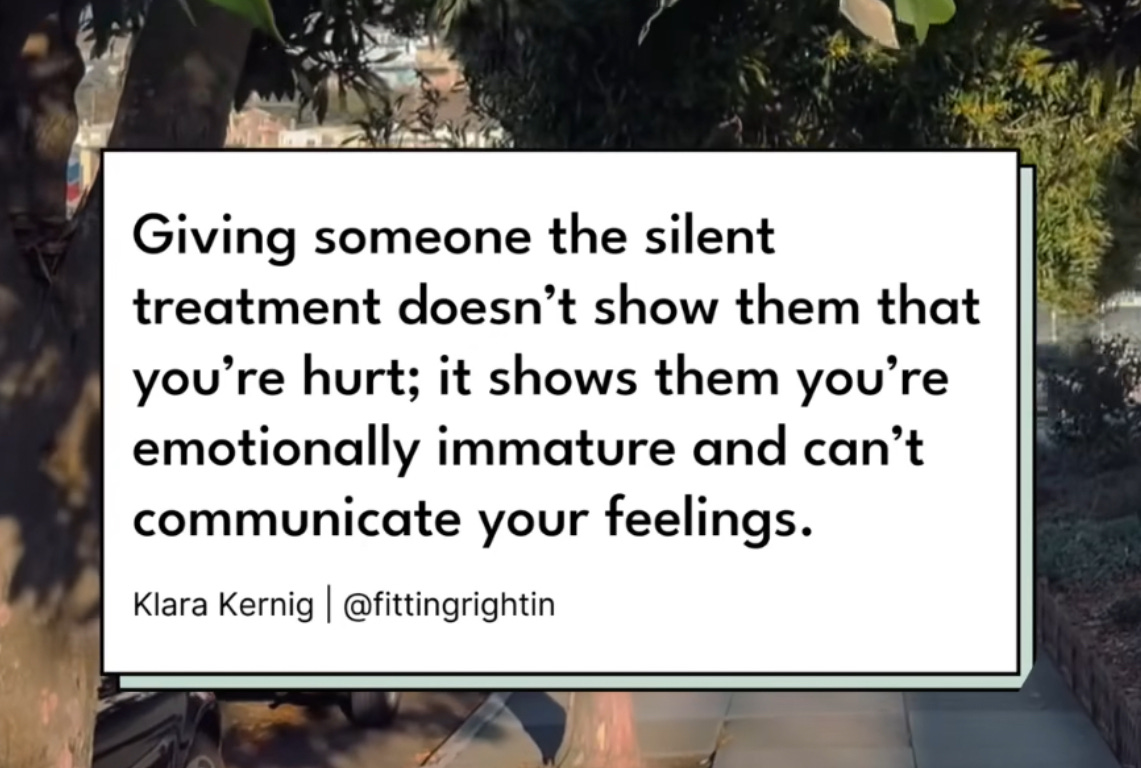Maybe it's time to be silent
When silence speaks louder than words (without hurting others)
Lately, silence has gotten a bad reputation. A recent topic that has shot up into the hits of social media is the silent treatment. While the silent treatment is a way to weaponize silence, what I find less discussed is constructive silence. In today’s article, I want you to explore with me how silence can be beneficial in our relationships. Strategically choosing silence can make a big difference, especially during difficult situations or with difficult people. While silence has gotten a bad reputation and is often painted as something to be avoided or used to punish people, I want to show you how you can use silence for personal growth and as a tool to strengthen your relationships.
Moments of Reflection is a reader-supported newsletter. Join our community of paid subscibers and see me in your inbox every Tuesday with a new article, journalling promps and tips to help you on your journey to recover yourself and stop people-pleasing.
If you’re like me, someone who needs time to reflect and process, then this article is for you. My recent reel about the silent treatment has gone viral on Instagram with over 1 Million views. Amongst the thousands of comments, many comments called me out, arguing that choosing not to speak to someone isn’t harmful or indicative of emotional immaturity.
Due to the sheer number of comments arguing this point, I decided to write today’s newsletter article. I want to show you how silence can be a tool in your recovering people-pleaser toolbox rather than just a way to punish and emotionally hurt others. As you’ll see there is a fundamental difference between choosing constructive silence versus using the silent treatment. If you want to understand what the difference is and see silence in a brand new light, take a few minutes to read the whole article.
Understanding the Power of Silence
Silence is often misunderstood to be something awkward, something that shouldn’t occur if things are good. What we fail to remember is that silence can be a great tool to improve our relationships as well as our personal development. Pausing, for example, can be a great way to keep yourself from acting out in emotionally charged situations, thereby preventing arguments from escalating and allowing you to create space to soothe and ground yourself before you decide on how you want to approach someone or a situation. Silence in the form of deliberately choosing to pause before mindlessly reacting allows you to act more mindfully, putting a stop to unnecessary arguments and hurt feelings.
Knowing When to Choose Silence
If you want to use silence as a tool to improve your relationships and further your personal growth, it’s key to finding the right moment to remain silent. It’s about understanding when what you have to say isn’t adding value to the conversation and when what you want to say may even be hurting others or yourself. Silence, in a way, is a reflection of self-control and (self-) respect, not to be confused with suppressing your thoughts and opinions.
Examples of when to choose silence:
When emotions are high, and what you want to say might escalate the situation.
Pausing to listen so you can genuinely understand the other person’s perspective.
Taking time to process before responding, for example, during discussions or arguments or when agreeing to compromise.
Recognizing when someone isn’t ready or willing to have a conversation.
Allowing others to speak and think about what they said.
Now, you may read this list and be confused about what the difference is between constructive silence and ‘the silent treatment’. If you do, don’t worry; I can guarantee you that you’re not alone.
The Difference Between Silence and ‘The Silent Treatment’
As the number of comments in my reel showed, many of us don’t understand the difference between choosing silence and using "‘the silent treatment’. It’s important to understand the difference so you can change if you want to, but also so you can understand when others treat you badly. Silence should never be used as a punishment or a tool to emotionally manipulate someone. We use silence as a punishment when we purposefully exclude someone or ignore their existence altogether. Traditionally, the silent treatment isn’t communicated. One simply chooses to remain silent without discussing it. I in-depth explain the silent treatment, its effects, and how to change as the one giving or receiving it here.
Constructive silence, on the other hand, is nothing like passive-aggressive withdrawal. Constructive silence comes from a place of mindfulness and emotional intelligence, whereas the silent treatment is a sign of emotional immaturity rooted in resentment or avoidance. Using silence as a tool for growth means communicating why you’re silent and using it to create time and space to address whatever is going on more thoughtfully and calmly. Here are some examples:
Silence as a Path to Personal Growth
Choosing silence can be a great tool to advance your personal growth. Being silent instead of speaking our mind unfiltered allows us to take a step back, asses our thoughts and emotions, and make a deliberate decision as to how we want to return to the situation, clear on our intention and level-headed instead of emotionally riled up. Here are examples of how choosing silence can advance your personal growth:
Silence allows for a moment of pause to prevent mindless reactions, fostering thoughtful responses instead.
Silence provides an opportunity to introspect and understand personal areas needing healing and growth.
Silence encourages listening more attentively to others, enhancing empathy and understanding.
Silence helps in managing emotions, and reducing impulsive and potentially harmful responses.
Utilizing silence effectively in response to jabs or provocations can be more impactful than verbal confrontation.
Quiet moments can lead to greater self-awareness and understanding of personal values and beliefs.
Silence allows time to think through problems and challenges, leading to more effective solutions.
Regular periods of silence can contribute to a sense of inner calm and resilience.
Journaling Prompts
Think of a recent situation where you chose silence. Was it constructive or more akin to the silent treatment? How did this choice impact both you and the other person involved?
Journal about a time when you felt the urge to react immediately in a conversation. How might silence have altered the outcome? What emotions were driving your urge to respond quickly?
Consider moments when you used silence for reflection or self-regulation. How has this practice contributed to your personal growth? Are there situations where you could have benefited from silence but chose to speak instead?
If you've enjoyed this article and are looking for more in-depth discussions, tips, and journaling prompts, consider becoming a paid subscriber. As part of our community, you'll receive exclusive content every Tuesday, including articles and resources tailored to help you on your journey toward self-discovery and improved relationship dynamics.
Until next time,
Klara








Thank you so much for this article! I feel like a breakup is a great way to use silence in a healthy way. A person made a decision to be done with you, and it's important to respect it unless they say otherwise. Silence is a great way to say "I respect your decision"